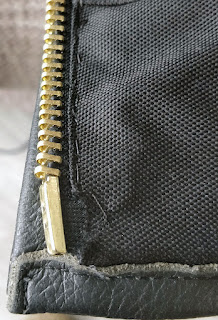 I'm still thinking over our day this past July, 2020 at SMART Adventures Off-Road Training. This was our third year taking off-road training with this fantastic program that runs out of Horseshoe Resort just north of Barrie in Ontario, Canada. If you're interested in expanding your bike-craft, this program will do just that, and they're open during the summer of COVID with all appropriate safety in place (masks, social distancing, temperature testing of all people prior to starting, etc).
I'm still thinking over our day this past July, 2020 at SMART Adventures Off-Road Training. This was our third year taking off-road training with this fantastic program that runs out of Horseshoe Resort just north of Barrie in Ontario, Canada. If you're interested in expanding your bike-craft, this program will do just that, and they're open during the summer of COVID with all appropriate safety in place (masks, social distancing, temperature testing of all people prior to starting, etc).Last year Clinton Smout, the owner and head instructor at SMART, had us all try balancing on a stationary trials bike, and that got me thinking about doing a session with them this time. I'd watched Ross Noble take a run at the Scottish Six Days Trial on TV which was gruelling and battering to his ego and always wondered just how different trials bike are from dirt bikes, so here was my chance!
I was on a GasGas 250cc two stroke trials bike, and it was like trying to hang on to a wild horse (I presume, I've never tried to ride a wild horse because I'm not crazy). It weighs about half what I do, has way too many horsepower and tries to squirt out from under you at every opportunity. I got Clinton as an instructor this time and he made a point of highlighting just how mad these things are. The brakes have thrown people over the handlebars and the acceleration has had people wheelie the machine on top of themselves, so if you're going to touch the gas or brakes expect it to respond way more suddenly than any other bike you've ridden.
How do you handle this madness? The clutch! A finger on the clutch and a finger on the front brake will reduce the arm pump you're going to experience (Clinton was right, I've gotten good at dirt bikes and can stay loose, but on this crazy thing my forearms were throbbing after an hour). Without supreme clutch control you're going to launch yourself into the sky on a trials bike. If you crack the throttle to make it go it'll try and throw you, if you hit the brakes too slow down it'll try and throw you. You need to modulate the clutch to manage these inputs with any kind of finesse.
I like to think I picked this up pretty quickly. The GasGas never threw me and I handed it back in the same condition I got it. Like everything else I've ridden my long body meant my back was what was taking the brunt as I had to bend over the machine. If I were ever to get my own trials bike it'd have risers or modified handlebars so I can stand straight up on it. Were I to go after trials riding (and a part of me is very trials-curious), I'd enjoy the violent focus it puts on your control inputs the most. Once you catch up to what the bike expects, it raises your clutch control to god-like levels.
In the afternoon I took out a Yamaha 250cc dirt bike and couldn't believe what that intensive morning on the GasGas had done to my clutch hand. Instead of too much gear changing or braking I was modulating the clutch constantly to ride smoother than I ever had before.
Suddenly situations that might have made me stop and adjust my gearing didn't matter. Between clutch and throttle I could manage deep sand, mud, 30° inclines (in deep sand) and axle deep puddles without hesitation. I couldn't believe the difference. When we stopped my son's ATV instructor said, "ok, you know what you're doing", which was a fantastic thing to hear.
If you have access to SMART Adventures (you can get yourself to Ontario, Canada in the summer of COVID), go. It'll improve your bike-craft even if you're a pavement focused rider. After you've got the off-road basics down take a swing at trials riding. It'll give you an appreciation of clutch control and drill you so aggressively in it that your left hand will come out of it with the twice the IQ it came in with.
 I even notice it while riding on the road. I was out on the Honda Fireblade the other day and noticed that my clutch hand was modulating the bike in new and interesting ways. In mid-corner as I'm winding out power my left hand is helping the bike deliver drive smoothly without me realizing it.
I even notice it while riding on the road. I was out on the Honda Fireblade the other day and noticed that my clutch hand was modulating the bike in new and interesting ways. In mid-corner as I'm winding out power my left hand is helping the bike deliver drive smoothly without me realizing it.I'm a strong advocate of life long learning and applying it to your bike-craft should be every motorcyclist's main purpose. If you want to keep enjoying the thrills of riding you should be looking for ways to better understand the complexities of operating these machines. A couple of hours working with trials bikes did that for me. I wish I had the means to chase down an ongoing relationship with these visceral, demanding and ultimately enlightening machines.























































